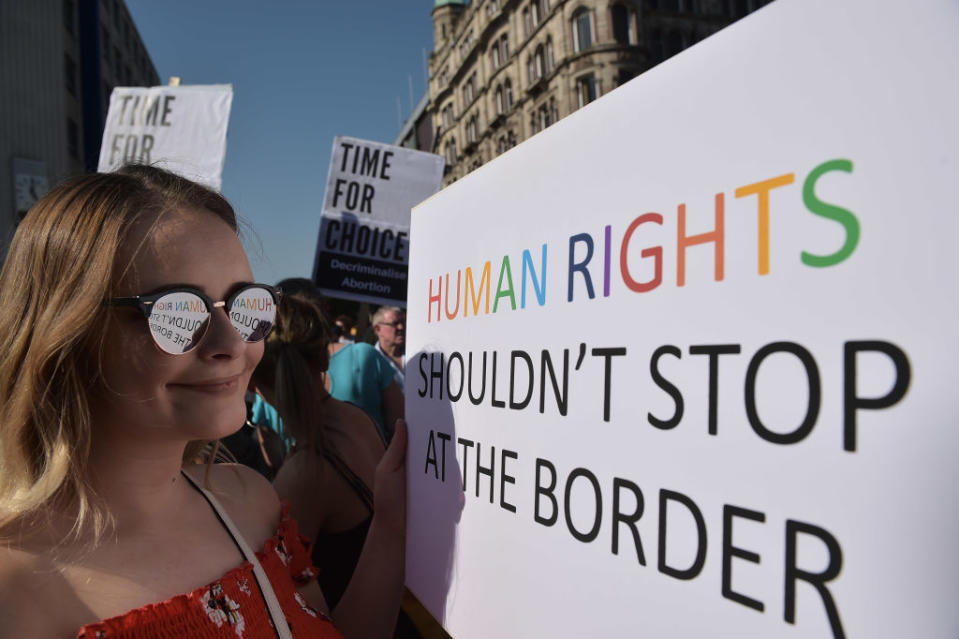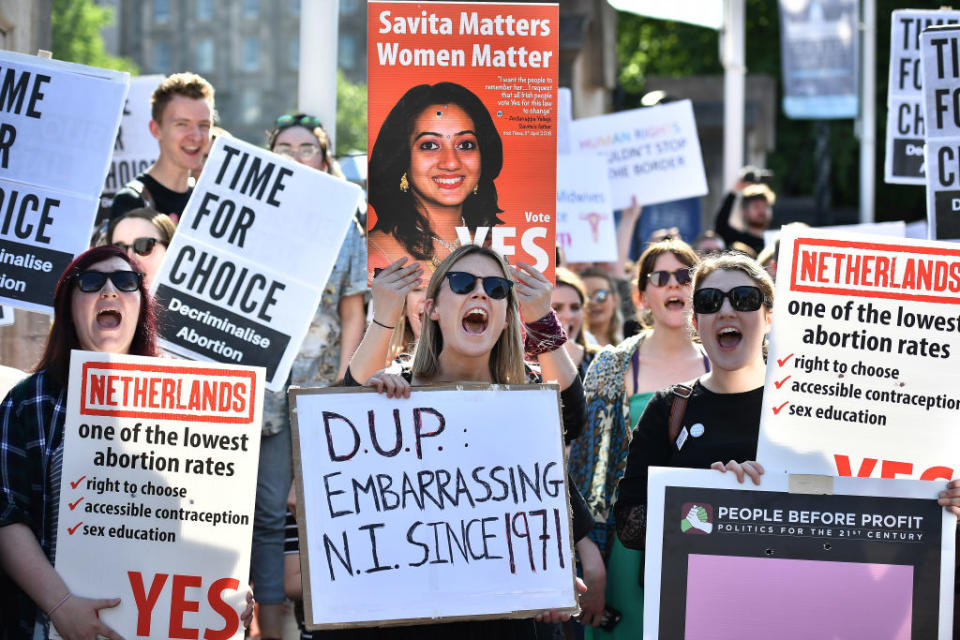Theresa May refuses to back abortion reform in Northern Ireland after praising Irish referendum result

Theresa May has refused to back repeated calls for abortion law reform in Northern Ireland.
In a referendum on Friday, the Republic of Ireland voted overwhelmingly to overturn the ban on abortion by 66.4% to 33.6%.
Since the result, there have been numerous calls for reform north of the border, where abortion is virtually outlawed.
The prime minister has been urged to back reform in Northern Ireland, which has different abortion laws to England, Scotland and Wales.
On Sunday, Mrs May tweeted her congratulations to Ireland for its referendum result, but she has remained silent on what the historic vote could mean for Northern Ireland.
“The Irish Referendum yesterday was an impressive show of democracy which delivered a clear and unambiguous result. I congratulate the Irish people on their decision and all of #Together4Yes on their successful campaign.” – PM @theresa_may #repealedthe8th
— UK Prime Minister (@10DowningStreet) May 27, 2018
Downing Street has said that the issue is a matter for the devolved assembly in Northern Ireland, but it hasn’t been in operation for 16 months.
At the weekend, Number 10 indicated that Mrs May was not willing to give MPs in Westminster a vote on Northern Ireland affairs, or a say on a potential abortion referendum there.
MOST POPULAR TODAY ON YAHOO
Father of dangling boy saved from balcony by Mali ‘Spider-Man’ was ‘out playing Pokemon Go’
Parachute sabotage wife says she doesn’t believe husband Emile Cilliers meant to kill her
Teen, 17, arrested over murder of 87-year-old man beaten in his own home
In pictures: Skies above the UK lit up overnight during the ‘mother of all thunderstorms’
And on Tuesday, Downing Street reiterated that message.
A spokesman for Mrs May said: “The prime minister said on Sunday that the Irish referendum was an impressive show of democracy, which delivered a clear result, and she congratulated the Irish people on the decision.
“But it’s important to recognise that the people of Northern Ireland are entitled to their own process, which is run by locally-elected politicians.

“Our focus is restoring a democratically-accountable devolved government in Northern Ireland so that locally-accountable politicians can make decisions on behalf of the public they represent.”
He would not give a time-frame on how long the British government was prepared to wait for the assembly in Northern Ireland to get up and running again.
Prominent Conservative backbencher Jacob Rees-Mogg said Mrs May should resist pressure to impose the reform of abortion laws in Northern Ireland.
Labour’s Baroness Chakrabarti said that the prime minister, as a “self-identifying feminist”, should legislate without delay to liberalise laws in Northern Ireland, where terminations are currently permitted only if a woman’s life is at risk or there is a permanent or serious risk to her mental or physical health.

Mr Rees-Mogg, a staunch Roman Catholic who opposes abortion as a matter of principle, said he was “saddened” by the referendum result in Ireland.
And he insisted it should be a matter for Northern Irish politicians to decide whether to relax the current restrictions.
He urged Mrs May to encourage all parties in Northern Ireland to restore devolved institutions including the Assembly, which has been suspended since January 2017.

“This issue is really one of devolution,” the North-East Somerset MP told LBC radio.
“This responsibility is devolved to Northern Ireland and if you respect our constitutional settlement then these issues ought to be decided in the right place.
“I’m aware that the Assembly isn’t currently sitting, but this is one of the reasons for encouraging Northern Irish politicians to bring their Assembly back together, so that they can settle these issues that are their responsibility.”
The prime minister faces a political headache over the issue because her fragile administration depends on the support in the House of Commons of the 10 Democratic Unionist Party MPs, who strongly oppose any reform to Northern Ireland’s strict laws.

 Yahoo News
Yahoo News 
